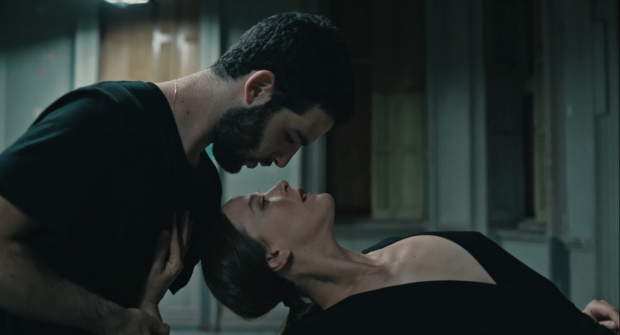
AVIVA
Outsider Films
Reviewed for Shockya.com & BigAppleReviews.net linked from Rotten Tomatoes by: Harvey Karten
Director: Boaz Yakin
Screenwriter: Boaz Yakin
Cast: Zina Zinchenko, Bobbi Jene Smith, Tyler Phillips, Or Schraiber, Omri Drumlevich, Mouna Soualem
Screened at: Critics’ link, NYC, 5/28/20
Opens: June 12, 2020
Writer-director Boaz Yakin may lead a life full of conflicts—a good thing because that is how people become creative—but his characters are certainly not lacking in bodily motion. His personal movie “Aviva” is chock-full of nudity, writhing bodies and modern dance and would have probably received an NC-17 rating rather than opting for NR, or not rated. It is not only about to be the year’s horniest film; it has the kind of dancing by veterans of Israel’s Batsheva troupe that Tschaikowsky (“Swan Lake,” Sleeping Beauty”) would not have understood. For that matter I wonder how many viewers will understand the film, given its use of masculine and feminine characterizations that serve to show us women with masculine sides and men with their feminine proclivities. Not that gender bending is unknown to the cinema, as it is expressed also by Luis Buñuel in his 1977 film “The Obscure Object of Desire,” in which a former chambermaid is played by two persons who differ physically as well as temperamentally.
In an interview, Yakin had said that his “adult creative life has been this very, very upsetting push and pull between trying to find a way to fit myself…This time I didn’t want to limit myself at all.” There it is: the background of a film seemingly without limits, one that deserves a second and third viewing to sort out the confusion as you watch a woman played in some scenes by a man and a man performing in the physical persona of a woman.
There are two principal players, the title character Aviva (Zina Zinchenko) and a man (Tyler Phillips), and then again Aviva as a man (Or Schraiber) and Eden as a woman (Bobbi Jene Smith). When Aviva moves from Paris to New York to be with Eden, the gent gets cold feet, conflicted over whether to marry her. (We are told in press notes that Aviva is based on the director’s relationship with his ex-wife Alma Har’el.) To understand this difficult, theatrical movie you must be aware that Aviva becomes a man unpredictably while Eden morphs into a woman, the idea being that they are expressing, respectively, their masculine and feminine sides.
As with any love affairs, most of the excitement is in the early stages, shown creatively enough in Eden and Aviva’s dancing through city streets—which may remind you of Gene Kelly’s resonating with an umbrella, singing in the rain. Aren’t first love and hormonal youth exhilarating? Eden and Aviva’s relationship are on and off, filled with both anticipation and heartbreak. When Eden is dabbling with his feminine side he changes from an indecisive male to a female full of hormonal tension. There are repeated scenes of sexual congress that border on hard core, with male and female frontal nudity displayed as though nakedness should be embraced (literally).
The best scenes, though, are those involving dances, particularly from a trio of thirteen-year-olds meant presumably to reflect the director’s childhood in the happiest moments, played here by Roman Maldenda. He and his two pals rap and show off terpsichorean talents in Coney Island, the iconic Wonder Wheel serving as background. Equally electrifying is a dance number in a bar as a group of denizens acting like Greek men showing their camaraderie with their footwork, burst forth with enough energy to light up the city.
The movie is overlong, though, and too intent on sexual scenes which seem thrown in to turn on a theater audience with vicarious thrills, the men, at least while they are still men, performing energetic thrusts to the gasps of the women who seem unable to get enough. Still, given the way that commercial films are equally repetitive, albeit with guns and car crashes rather than sex serving as melodrama, “Aviva” is an offering that deserves the attention of a patient audience open to its experimental nature.
116 minutes. © 2020 by Harvey Karten, Member, New York Film Critics Online
Story – B
Acting – B+
Technical – B
Overall – B
